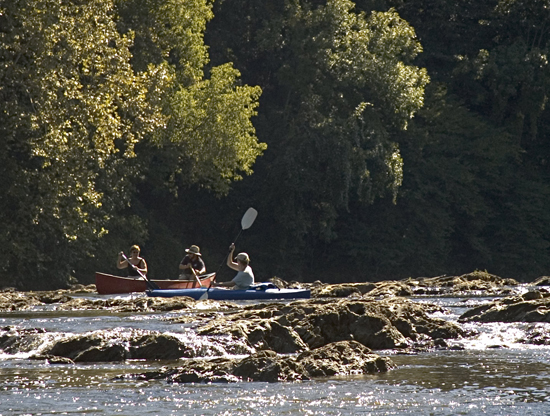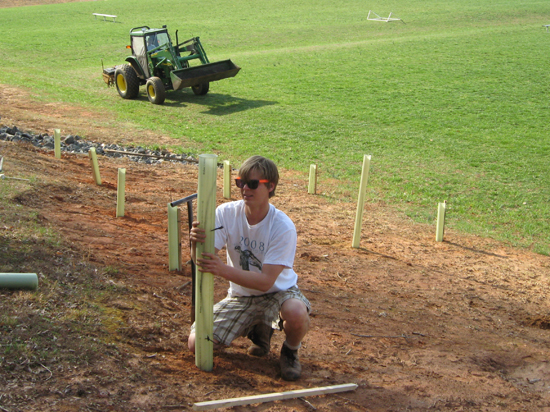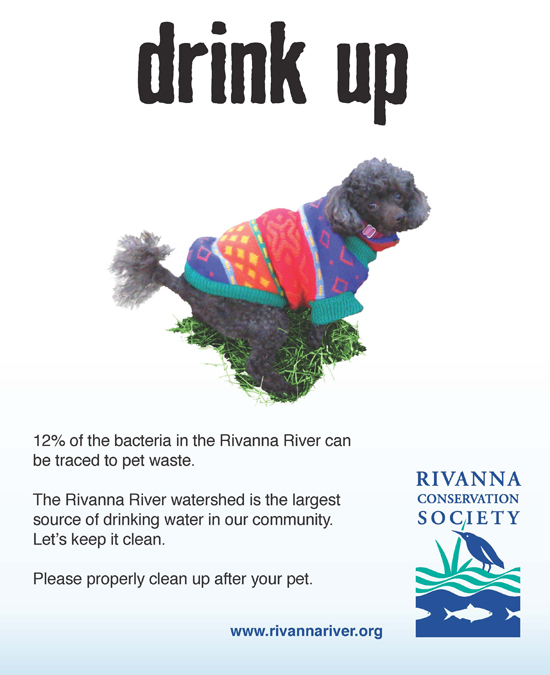Watershed Wednesday: Rivanna Conservation Society
RCS is dedicated to cleaning up the Rivanna River, a 42-mile James River tributary that flows through central Virginia.
When Robbi Savage’s 10-year-old grandson Seth saw a car battery submerged in the Rivanna River near Charlottesville, Virginia, he knew enough not to pick it up. Instead, he asked his dad for help, and with more frustration than curiosity, exclaimed to Robbi, “What are these people thinking, grandma?!”
“Even a 10-year-old knows that throwing car parts into the river is dangerous,” says Robbi, executive director of the Rivanna Conservation Society (RCS), a non-profit watershed group based out of Charlottesville. “And yet some folks still think of a river as a trash dump.”

(Image courtesy Rivanna Conservation Society)
Robbi and RCS’s volunteers are dedicated to cleaning up the Rivanna, a 42-mile-long James River tributary that flows from the Blue Ridge Mountains through the foothills and Piedmont region of central Virginia. It was the first river in Virginia to be designated a “Scenic River.” Although the Rivanna may be “scenic,” RCS understands that maintaining its beauty and enhancing its degrading health requires citizen participation, education and local government involvement.
“One would think that being at the headwaters, we would have close to pristine waterways, but such is not the case,” Robbi explains. “We certainly have our challenges.”
One of the Rivanna’s biggest problems is stream bank erosion, which pollutes the water with too much sediment. Bacteria from pet waste and agricultural manure also threaten swimming areas and drinking water resources; this occurs when residents don’t pick up after their pets, or when farmers allow cattle to enter streams.
RCS’s education and outreach programs have been building awareness of these issues since the group was founded in 1990. But RCS doesn’t forget to have some fun along the way. River paddles, survival workshops and geocaching are just a few outdoor activities the group sponsors.
A river classroom

(Image courtesy Rivanna Conservation Society)
When Robbi moved from Washington to central Virginia in 2006, she brought with her an environmental initiative she conceived while working on national water policy in Washington. The international citizen-led water quality monitoring effort World Water Monitoring Day involved 340,000 people in 77 countries in 2011. When Robbi left the Hill to become RCS’s executive director, she created a local version of the program, “Water Health for the Commonwealth.”
The program allows middle and high schools along the Rivanna and James Rivers to monitor their local water quality and connect with one another to share their results. RCS is in the process of extending this hands-on-learning opportunity to all schools along the James, from the Rivanna watershed to the Chesapeake Bay.
This “in the river” approach not only educates, but creates an appreciation for the “River Anna,” named after Queen Anne of England.
In addition to education initiatives, recreational opportunities such as river paddles and geocaching (a treasure hunt-like activity) allow area residents of all ages to get outside and appreciate the scenic Rivanna.
“Recreation is an important part of what this river is used for,” explains Robbi. “But the more people you bring to the river, which is of course part of our mission, the more attention needs to be paid to keeping it clean. We have a beautiful river here, so people want to paddle, and they want to be on the water.”
From the Hill to the foothills
For Robbi, RCS represents community collaboration.
Robbi gained experience in environmental issues at the national and international level in her 35 years of working for EPA Office of Water, the League of Women Voters, and the State and Interstate Water Pollution Control Administrators (now Association of Clean Water Administrators).
But when she moved to central Virginia and became involved with RCS, she experienced the challenges and successes of converting Washington’s laws and regulations into local action.
“When you work in Washington, you may come to believe that it is the center of the universe,” explains Robbi. “But when you move to a location like Charlottesville and see what it takes in terms of voter support, local government coordination, and funding decisions, it’s eye-opening. We all know that water quality is important and essential to all living things, but when you actually see the demands for scarce community resources to play out, especially in this zero-based budget economy, you understand that tough choices are being made.”
Although coordinating community leaders, landowners, citizen volunteers, lawmakers and environmentalists is no easy task, Robbi describes it as rewarding. “I would never have said this as a young pup in DC, but I think the real action is at the local level. We are turning words into action.”

(Image courtesy Rivanna Conservation Society)
More from the Rivanna Conservation Society (RCS):
- “Drink Up” posters make the connection between pollution in the Rivanna River and the community’s drinking water supply.
- The Scheier Natural Area, a 100-acre parcel of land with eight ponds and more than 3 miles of trails, was given to the Rivanna Conservation Society by Howard and Neva Scheier in 1997.
- RCS removed the historic (177-year-old) Woolen Milles dam to allow migratory fish such as shad, herring and American eel to navigate through the Rivanna.
- Participants in the “Flexing our Mussels” program on June 23 will go into the Rivanna to look for and identify mussels. Lucky mussel hunters may even come across the James River spiny mussel, an endangered species!
- Experience the Rivanna throughout all four seasons in this photo slideshow.
- Visit RCS’s website regularly for upcoming events, internship opportunities and ways to get involved.

Comments
There are no comments.
Thank you!
Your comment has been received. Before it can be published, the comment will be reviewed by our team to ensure it adheres with our rules of engagement.
Back to recent stories